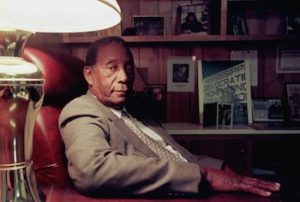
Charles Evers
*Charles Evers was born on this date in 1922. He was a Black activist, businessman, disc jockey, and politician.
James Charles Evers was born in Decatur, Mississippi, to James Evers, a laborer, and Jesse Wright Evers, a maid. He was the eldest of four children; his younger brother was Medgar Evers. He attended segregated public schools, which were typically underfunded in Mississippi following the exclusion of African Americans from the political system by disenfranchisement after 1890. Evers graduated from Alcorn State University. During World War II, he served in the United States Army. Evers fell in love with a Philippine woman while stationed overseas. He could not marry her and bring her home to his native Mississippi because the state's constitution prohibited interracial marriages.
Before and after the war, Evers hustled in bootlegging operations, prostitution, and numbers in Mississippi and Chicago. He revealed this part of his past in 1971 before campaigning for governor. He said he was not proud of it, but was proud that he had changed his life and left such criminal activities far behind. In 1949, Evers began a career in radio as a disc jockey at WHOC in Philadelphia, Mississippi. Evers, along with his younger brother, was known for his role in the civil rights movement. In 1954, he was made the National Association for the Advancement of Colored People (NAACP) State Voter Registration chairman.
After his brother's assassination in 1963, Evers took over his position as field director of the NAACP in Mississippi. In this role, he organized and led many demonstrations for the rights of Blacks. In 1969, Evers was named "Man of the Year" by the NAACP. On June 3, 1969, Evers was elected in Fayette, Mississippi, as the first Black mayor in Mississippi since the Reconstruction era, following the passage of the Voting Rights Act of 1965, which enforced constitutional rights for citizens. At the time of Evers's election as mayor, the town of Fayette had a population of 1,600, of which 75% was Black and almost 25% white; the white officers on the Fayette city police "resigned rather than work under a black administration," according to the Associated Press. Evers told reporters, "I guess we will just have to operate with an all-black police department for the present. But I am still looking for some whites to join us in helping Fayette grow."
Ever since, the carrying of firearms has been outlawed within city limits. Evers was briefly married to Christine Evers until their marriage ended in annulment. In 1951, Evers married Nannie L. Magee, with whom he had four daughters. The couple divorced in June 1974. He ran for governor in 1971 and the United States Senate in 1978, both as an independent candidate. In 1989, Evers was defeated in his re-election bid after serving sixteen years as mayor. In his later life, he became a Republican, endorsing Ronald Reagan in 1980 and Donald Trump in 2016. This diversity in party affiliations throughout his life was reflected in his fostering friendships with people from various backgrounds and his advising of politicians from across the political spectrum.
After his political career ended, he returned to radio and hosted his show, Let's Talk. In 2017, Evers was inducted into the National Rhythm & Blues Hall of Fame for his contributions to the music industry. Evers wrote two autobiographies or memoirs: Evers (1971), self-published, and Have No Fear, published by John Wiley & Sons (1997). In his later years, he lived in Brandon, Mississippi, and served as station manager of WMPR 90.1 FM in Jackson. On July 22, 2020, Charles Evers died in Brandon at age 97.